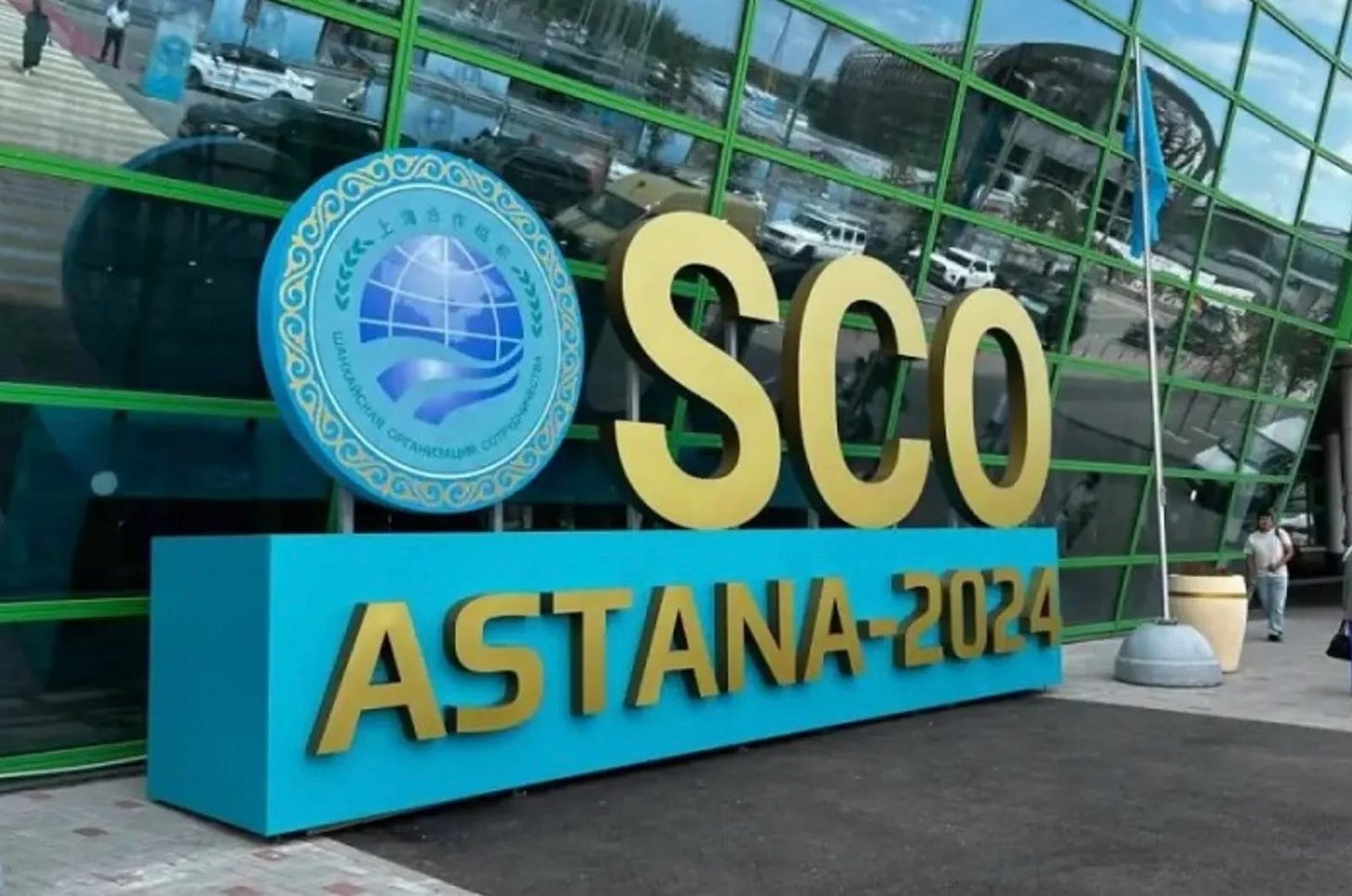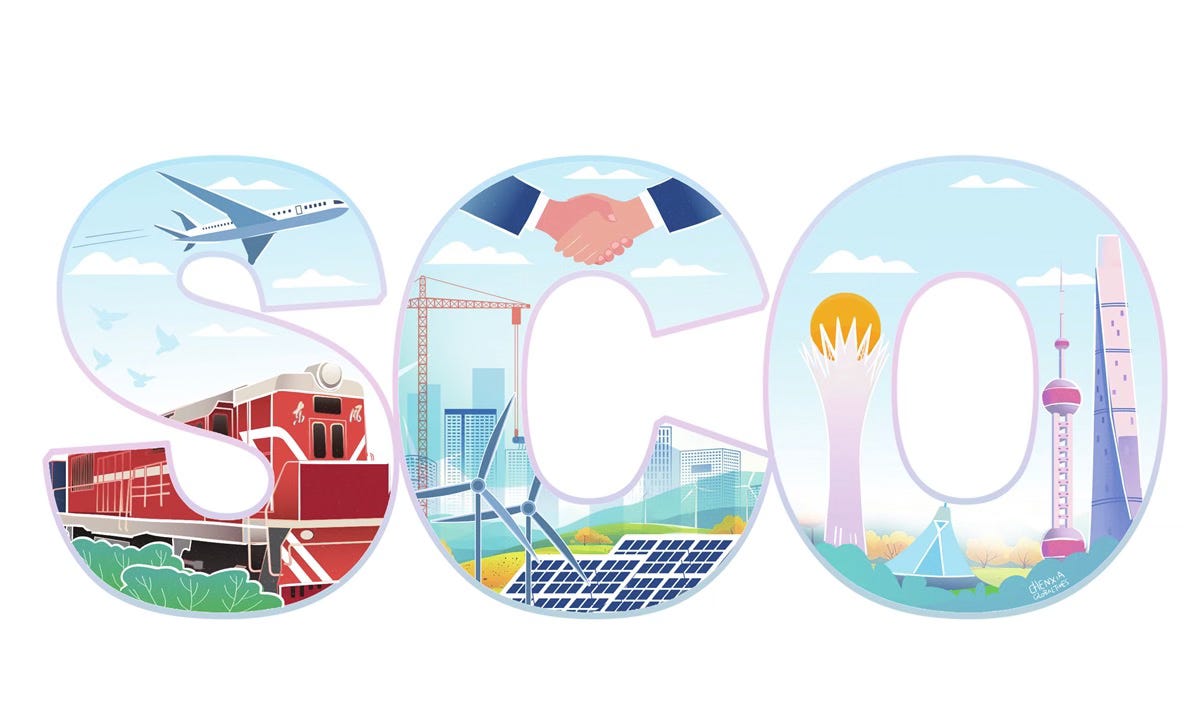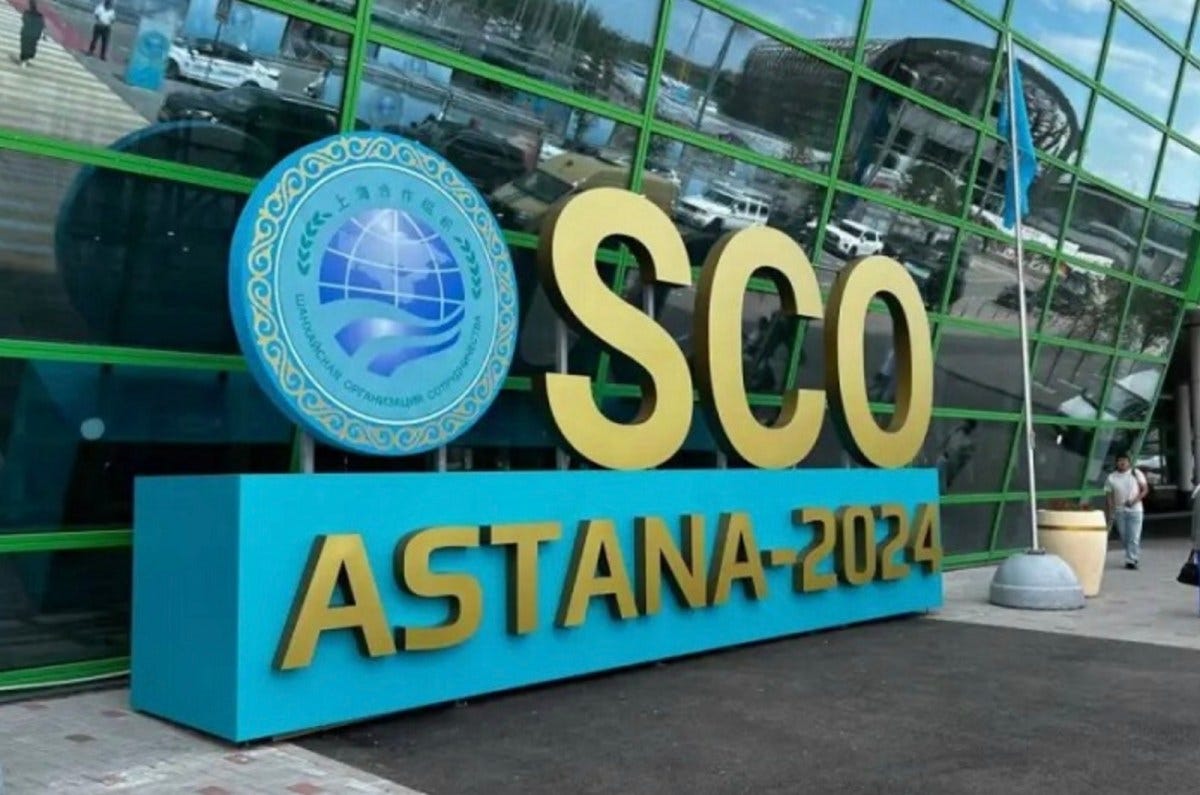Central Asia Stabilisation
The SCO is now the regional organization with the largest territory and population in the world.
By Timofei Bordachev (Valdai Club)
The possible decline of the idea of states cooperating and creating international organizations is one of the greatest dangers facing us today. This threat is linked to the fact that the US and its allies have long seen all multilateral formats only in terms of their own interests. In recent years, this has largely paralyzed the work of the UN and European security organizations. It is therefore to be welcomed when sovereign states are able to work together on an equal footing in institutions that they themselves have created. One of the biggest examples of this is the Shanghai Cooperation Organization (SCO). Its summit took place this week in Astana, Kazakhstan.
Sixteen world leaders attended this year's summit. The SCO is now the regional organization with the largest territory and population in the world. Most importantly, it does not serve the interests and values of one of its participants, but upholds the "Shanghai Spirit": equality, mutual benefit and diversity. In this way, the SCO is an example of a new type of cooperation based on mutual benefit rather than imposing its will on the rest of humanity.
In the first phase of its activities following its establishment in 2001, the SCO has made a decisive contribution to the stability of the region. These achievements reflected the aspirations of the countries that founded the SCO, to make their common space free of internal interstate contradictions. Almost all the problems these states faced in their bilateral relations have now been resolved. But to achieve true harmony and prosperity, the countries of the region still have a long way to go.
The main task seems to be to make the geopolitical center of Eurasia invulnerable to external interference through joint development. It is precisely such intervention that has traditionally been seen in the West as a way of influencing the position of Eurasian states and their foreign policy. The SCO creates a Eurasian security space where mutual trust prevails. This is the most important achievement. It must be preserved and developed. Internal trust is also the most attractive feature of the SCO in the eyes of the outside world.
The participation in the summit of countries that are not yet members of the SCO proves that many countries see the SCO as a guarantee of their sovereignty. Therefore, today the SCO is creating a new international reality and solving the most important problem for all countries in the world: the protection of their independence in domestic and foreign policy. These ideas are expressed in the Astana Declaration, which reflects the position of the participating countries on key issues of development and security at the global level. The SCO Initiative on World Unity for a Just Peace, Harmony and Development was also presented. Through political and diplomatic means, it will launch a joint search for a formula for a just peace to ensure international security.
For the first time, UN Secretary-General António Guterres attended the summit. The UN remains the main institution of the international order, the preservation of which is a priority for Russia, China and the rest of the SCO countries. It seems important that the head of this organization should try to maintain a balance between those who defend the old international order and those seeking to create a new one. The new international order, unlike the old, will be the result of compromise. But the journey toward that compromise will be long and difficult and will involve many risks to international security. The participation of the UN Secretary-General in the summit is a confirmation of the high authority of the SCO in world affairs.
Cooperation in addressing the key development issues of the member states and preventing certain threats is the third area of SCO activity. To this end, the summit adopted the SCO Development Strategy until 2035 and the Strategy for the Development of Energy Cooperation until 2030. The latter document is expected to provide new impetus and tools for cooperation in the fields of oil and gas, electricity and renewable energy. The Cooperation Program to Counter Terrorism, Separatism and Extremism for 2025-2027 and the SCO Anti-Drug Strategy for 2024-2029 were also adopted. For the future, it is important to develop cooperation in artificial intelligence and high technology.
The SCO provides an example of how member states can work together in three crucial dimensions: maintaining regional stability, strengthening the global order, and addressing practical issues of development and security. The SCO's activities and achievements show that if cooperation with Western countries is difficult now, it does not mean that cooperation is impossible in principle. The world is not heading toward uncontrolled chaos, and most states continue to seek to manage their relations in a civilized manner.
Read more here.
Shanghai Cooperation Organization takes another giant step
Astana SCO Summit treated by Western media as a non-event but the reality is Eurasian integration is pressing ahead with great gusto
The Shanghai Cooperation Organization (SCO) held its 24th summit of heads of state on July 4 in Astana, Kazakhstan. Major Western media excoriated the event when they didn’t ignore it all together but it proved to be one for the record books.
It brought together in a single room the leadership of countries representing 80% of the Eurasian landmass, 40% of the global population and nearly 30% of global GDP. The fruit of more than two decades of inter-Eurasian diplomacy, the SCO has ten full members (Belarus joined on July 4) and 14 “dialogue partners” from Asia and the Middle East, including Saudi Arabia.
The summit participants approved 25 strategic documents covering energy, security, trade, environment and finance.
The message, of course, is that Eurasian integration continues to press ahead with unmitigated gusto despite (or more likely because of) bloody conflicts, barefaced meddling by outside powers in the internal affairs of Asian nations and the increasing unreliability – repeatedly articulated – of the US dollar as a “non-partisan” means of exchange and store of value.
Eurasian security concept
The real story of the SCO Summit, for anyone paying close attention (I was there), is that Eurasian countries are moving to establish an indivisible, Eurasia-centric collective security framework that would work alongside post-WWII international security architecture, despite the latter’s shortcomings and contradictions.
Missing this deeper point, many in the Western press corps characterized the summit either as a forum for business development, an exercise in fruitless optics or an effort to acquire prestige on the part of states languishing in the gulag of non-Western, misfit nations.
As stated in the Astana Declaration, “[the member states] consider unacceptable attempts by individual countries or groups of states to provide for their own security at the expense of the security of other states.” Turkish President Recep Erdogan echoed this view:
“As Turkey, we constantly draw attention to the shortcomings of the current international order. Despite all obstacles, we are working to build an effective international system where right makes might – not the other way around – and which embraces the whole humanity, promotes peace, security, stability, and prosperity, tackles economic disparities, and eliminates global injustices.”
Member states would welcome any Eurasian country joining the SCO, subject to regular accession criteria. China has specifically stated that it welcomes US allies to participate in what it calls a new security arrangement.
The list of applicants is growing, and explains, in part, the presence at the Summit of Amir H H Sheikh Tamim bin Hamad Al Thani (Qatar) and H H Sheikh Saud bin Saqr Al Qasimi, Supreme Council Member and the Ruler of Ras Al Khaimah (UAE).
Turkey, a member of NATO, is close to signing up as a full member, following in Iran’s footsteps. “We want to further develop our relations with Russia and China within the Shanghai Cooperation Organization. We believe they should accept us not just as a ‘dialogue partner’ but as a member like the others,” said Erdogan.
SCO chair and host of the confab, Kazakhstan’s President Kassym-Zhomart Tokayev, underscored the summit’s underlying focus on security: “Today, the world is facing serious challenges due to unprecedented geopolitical contradictions and growing conflict potential. The architecture of international security is under threat, which could lead to dire consequences for all of humankind. In such a crucial period, we have a great responsibility to strengthen peace, stability, and security through collective efforts at regional and global levels.”
Chinese President Xi Jinping made the same point: “No matter how the international landscape changes, the [SCO] must uphold a common, comprehensive, cooperative, and sustainable security [system]. Real security is premised on the security of all countries.”
President Mirziyoyev of Uzbekistan stated that SCO members should build on the “Shanghai Spirit” of unity and cohesion and “intensify joint efforts to strengthen the atmosphere of trust and friendship within the SCO and to remove barriers to deeper cooperation. First of all, it is necessary to undertake a comprehensive reevaluation of the conceptual foundation underpinning the SCO’s security-related activities.”
The heads of state of Azerbaijan, Belarus, Iran, Kyrgyzstan, Mongolia, Pakistan, Russia, Tajikistan and Turkey echoed these sentiments. Indian External Affairs Minister Jaishankar represented Prime Minister Narendra Modi at the SCO.
A Western press report suggested that Modi did not attend the SCO Summit because he felt “unease among some members about the direction the SCO is headed.”
Actually, according to Indian sources, Modi, besides having urgent parliamentary duties, was reluctant to engage with President Xi until further progress is made at the ministerial level on resolving Sino-Indian border issues along the Line of Actual Control in Ladakh.
For Modi and Xi to have met would have been premature. Border issues between the two heads of state will probably be left until the October 2024 BRICS meeting in Kazan, Russia. Yes, Modi missed out on meeting President Putin in Astana but the two leaders were already scheduled to meet in Moscow on July 8during the NATO summit in Washington.
To say that Modi is uneasy with the direction of the SCO is nonsense. It’s more likely that Western think tank mandarins are uneasy with India’s emerging strategic autonomy – but that’s another story.
SCO de-dollarization
Meanwhile, SCO members reaffirmed their intention to increase the use of national currencies in trade between countries and called for the expansion of non-SWIFT payment and settlement systems within the group.
Once again, President Tokayev summed up the view: “The process of transition to settlements in national currencies has gained positive momentum.” The Astana Declaration said: “Member States emphasized the importance of further implementation by interested states of the SCO for a gradual increase in the share of national currencies.”
The SCO’s efforts to move away from Western payment and settlement systems will continue to gain momentum as long as the West continues to apply unilateral sanctions and restrictions on the use of US dollars, which the Global South and SCO members view as incompatible with international law and property rights.
In conclusion, the 2024 Astana Declaration was no simple rehash in bureaucratese of the 2022 Samarkand Declaration. In its SCO+ format, the Astana Declaration represented a thoughtful set of statements and principles about the intentions and policies of the organization’s members. To dismiss it and the speeches of the SCO’s members as mere banter or as a prestige-building exercise would be a fool’s errand.
The SCO’s aim of creating a new Eurasia-centric collective security framework that recognises the sovereign autonomy of independent nations in a multipolar world and the principle that peace is best served by a foreign policy that pursues the common good is the real story from the Astana 2024 SCO Summit.
Western think tank mandarins should pay attention; the nations of Eurasia and the Global South certainly are.
Read more here.






